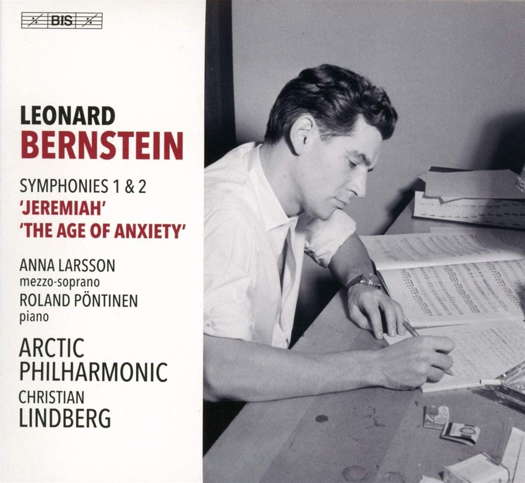 SPONSORED: Vocal Glory - Massenet's Manon in HD from New York Metropolitan Opera, enjoyed by Maria Nockin.
SPONSORED: Vocal Glory - Massenet's Manon in HD from New York Metropolitan Opera, enjoyed by Maria Nockin.
All sponsored features >>

Meaning and Identity
GERALD FENECH listens to
Leonard Bernstein's first two symphonies
'A wholly impressive issue, brilliantly performed and recorded ...'
Leonard Bernstein was only twenty-one years old when, in the summer of 1939, he sent Aaron Copland a Hebrew song for mezzo-soprano which he called 'Lamentation', with the hope of getting a positive judgement. Indeed the song meant a lot to Bernstein, and as he had predicted, it eventually became a movement of a symphony, the first, called 'Jeremiah'. He presented the work in a composition contest sponsored by the New England Conservatory, but the piece did not win; still, luck was on Bernstein's side.
Fortunately, Bernstein's conducting teacher, the famous Fritz Reiner, found much to appreciate in the symphony, and in January 1944 the composer gave the premiere of the work with the Pittsburgh Symphony Orchestra, Reiner's own orchestra, to great critical acclaim. In his original programme notes Bernstein makes the point that what he sought to convey in his setting of the 'Lamentation' song - the third movement - was not the narrative of the Temple's destruction in Jerusalem in 586 BC by the Babylonians, but the emotional quality of this cataclysmic event.
The symphony is in three movements: the first, 'Prophecy', aims only to parallel in feeling the intensity of the prophet's pleas for conversion.
Listen — Bernstein: Prophecy (Symphony No 1)
(track 1, 0:28-1:23) © 2020 BIS Records AB :
The second, 'Profanation' - a Scherzo - is an attempt to describe in a general sense the chaos and destruction inflicted by the pagan corruption of priests and people.
Listen — Bernstein: Profanation (Symphony No 1)
(track 2, 3:00-3:39) © 2020 BIS Records AB :
The third, 'Lamentation', being a setting of a poem, is more of a literary conception. It is the anguished cry of Jeremiah as he mourns the total ruin of his beloved Jerusalem after his herculean efforts to save it.
Listen — Bernstein: Lamentation (Symphony No 1)
(track 3, 0:42-1:29) © 2020 BIS Records AB :
A 1944 birthday present in the form of a sketch to another of Bernstein's mentors, Serge Koussevitsky, was the germ that gave birth to the Second Symphony. Inspired by W H Auden's 1947 poem The Age of Anxiety, the work's essential line is the record of our difficult search for 'faith', and the music strongly complements the text of the poem. In 'The Prologue' and the two sets of variations in Part I, which parallel 'The Seven Ages' and 'The Seven Stages' of Auden's poem, four characters, three men and a woman, express their anxieties and quest for meaning and identity.
Listen — Bernstein: The Seven Stages (Symphony No 2, Part I)
(track 6, 2:00-2:41) © 2020 BIS Records AB :
In Part II the quartet take a cab to the woman's apartment - 'The Dirge' - where Rosetta and Emble experience a romantic attraction - 'Masque'.
Listen — Bernstein: The Masque (Symphony No 2, Part II)
(track 8, 1:08-2:03) © 2020 BIS Records AB :
After escorting Quant and Malin to the elevator, Rosetta returns in 'The Epilogue' to make love with Emble. This intimate moment falls through as Emble falls asleep. Bernstein did not attempt to capture the storyline. He did, however, preserve Auden's two-part structure, three sections in each part, and the poet's six section titles. Bernstein also chose to portray all four characters via a single instrument, the piano.
The Symphony was premiered in April 1949 by Koussevitsky himself, but the reception was mixed. Lucas Foss, a composer and pianist, praised the Symphony and thought it ranks among America's fifteen best works. On the other hand, the great Stravinsky once asked Robert Craft to turn off a recording of The Age of Anxiety. Worse still, Auden disliked the work so much that he wrote, shamefully unkindly, 'Leonard Bernstein is shit'. Opinions apart, these symphonies are revelatory, hugely emotive and personal, and filled with a desire for the brotherhood of man to be something real. A wholly impressive issue, brilliantly performed and recorded, with high-tech notes as an added bonus.
Copyright © 16 May 2020
Gerald Fenech,
Gzira, Malta

SACD INFORMATION: SYMPHONIES 1 AND 2 / CHRISTIAN LINDBERG
FURTHER INFORMATION: LEONARD BERNSTEIN
FURTHER INFORMATION: BIS RECORDS



